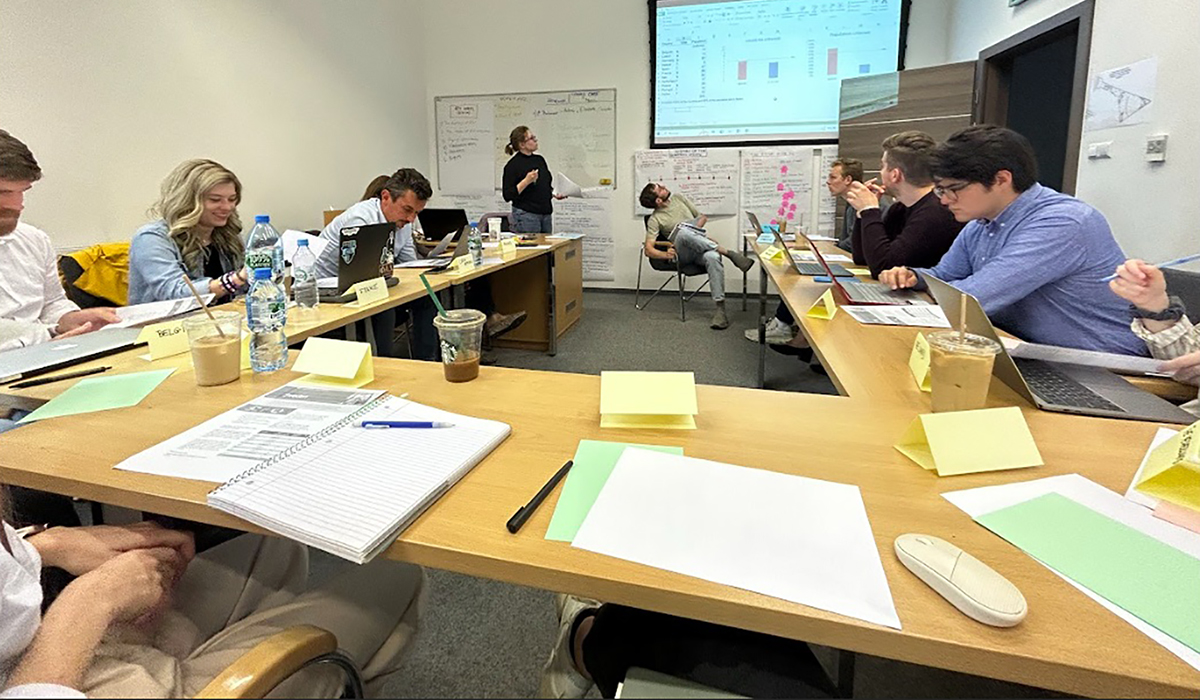Courses for Summer 2026
Each summer, Catholic Law offers a focused set of courses designed to give students unique perspectives on European and international business law—topics not commonly taught in the U.S. classroom.
In past years, courses have included subjects such as human rights, arbitration, constitutional law, and international economic regulation.
In summer 2026, students may choose from four courses: Law of the European Union, International Investment Law, Comparative Tax Law and America at 250: Individual Rights at the American Founding, the Supreme Court, and the United Nations.
All classes are taught in English at the historic Jagiellonian University. U.S. students must take between four and six credits. Assessment methods vary, with most courses concluding with a written exam, while some faculty may adopt take-home assignments or research papers.
Schedule of Classes
Specific course dates and titles will be provided soon.
Classroom Course Descriptions
America at 250: Individual Rights at the American Founding, the Supreme Court, and the United Nations ( 2 credit hours) - Professor Derek A. Webb
On July 4, 2026, America will be celebrating the 250th anniversary of the Declaration of Independence. In this seminar, we will examine the meaning of the Declaration’s famous claim that “all men” are “created equal” and “endowed by their Creator with certain unalienable rights” in the context of the philosophy of the American founding, contemporary American constitutional law, and international human rights law.
First, using chiefly primary sources from the American founding period, with the aid of some select secondary readings, we will explore what the American founders meant exactly by the concept of “unalienable rights.” Next, shifting to the contemporary legal landscape, we will study how individual rights claims are being understood and litigated in contemporary constitutional cases at the U.S. Supreme Court, by reviewing a handful of the most significant rights cases over the past ten years. Finally, broadening out to the global stage, we will examine the meaning of human rights as they have been identified and articulated in the Universal Declaration of Human Rights.
Our goal will be to better understand the concept of rights – their philosophical foundation, historical understanding, and contemporary legal meaning and scope – in the context of both the American experience and the world stage.
Comparative Tax Law ( 2 credit hours) - Professor Regina T. Jefferson
Tax systems serve as a means of funding important public services such as the provision of healthcare, education, and infrastructure in addition to being used as tools to advance economic and social policy. As a result, tax laws are often complex. This complexity can present significant challenges for tax systems throughout the world regarding not only design and effectiveness but also considerations of equity, efficiency, and enforceability. Using a comparative approach, this course examines the rules, policies, and structures of different countries’ tax systems based on how they address and solve the practical problems of balancing these competing concerns. By comparing and contrasting the structure and rules of the United States tax system with those of other countries, upon completion of this course students will have a conceptual understanding of different types of taxes, familiarity with how tax systems differ from a functional perspective, and an appreciation for some of the common characteristics that exists among various tax systems used across the globe.
There are no prerequisites for this course. Examination.
Law of the European Union (2 credit hours) - Dr. Marta Janina Kuklo
This course provides an overview of the political and legal framework of the European Union institutions, trade relations and legal and business implications of the European process of integration. The course focuses on the creation of the European Union, the structures and processes for the development of the Union’s law, four basic freedoms or the role of the European Court of Justice.
International Investment Law (2 credit hours) - Prof. Piotr Szwedo
International Investment Law (2 credit hours) The course addresses a range of questions related to international investment law. This branch of international public law has already drawn special attention of legal scholars but also due to numerous arbitration proceedings worldwide, it became a field of intensive legal practice. Emphasis will be put on the specificity on Bilateral Investment Treaties as sources of international law and on case law which plays the role of clarification and creation of legal standards. Students will be also introduced to the specificity international responsibility resulting from international investment claims which is partly based on international customary law. Furthermore, we will also examine the definition of investment, definition of State and learn about standards of investment treatment (Most Favored Nation, national, fair and equitable standards). We will also study about direct and indirect expropriation; standards of compensation; principles of the settlement of investment disputes and about enforcement of arbitral awards. The course involves students’ active participation: discussions, debates, presentations, collective and individual feedback providing on their individual and/or group tasks; grade is based on class participation and/or final written examination.
Course materials: Provided on the course website
Books, Course Materials and Library Facilities
The list of required books will be made available to participants in the spring.
Students are responsible for purchasing their own books and course materials. Students will be notified of course materials that are prepared by the Columbus School of Law and made available at cost to participating American and Canadian students upon arrival in Kraków. European students will have access to all texts and materials used in the program.
Students will also have access to the outstanding resources of the Jagiellonian University library as well as to the specialized collection of the library of the Faculty of Law. Approximately 20 percent of the Jagiellonian’s collection of 2.8 million books and periodicals are in English. The library is open during weekday hours and a limited collection of materials suggested by the faculty will be held on reserve at a place convenient to all students.
Students will receive wi-fi access in Jagiellonian University classrooms.

